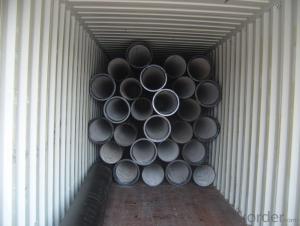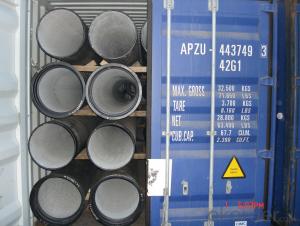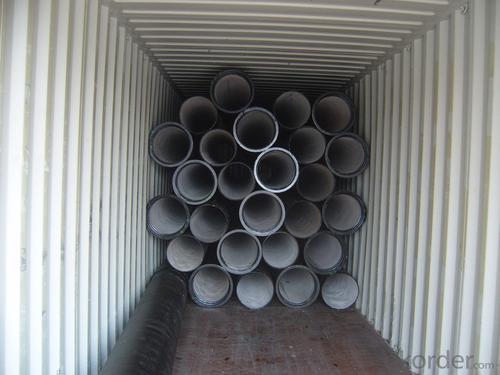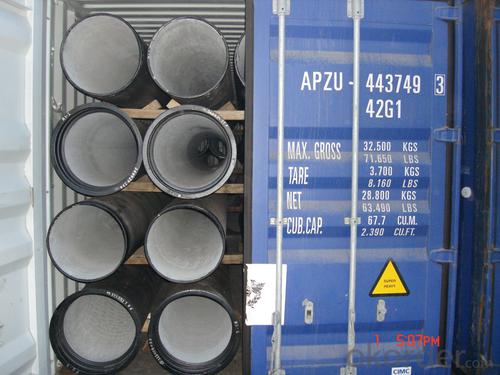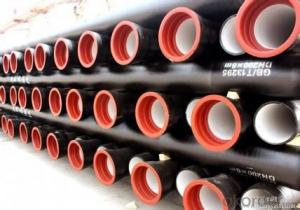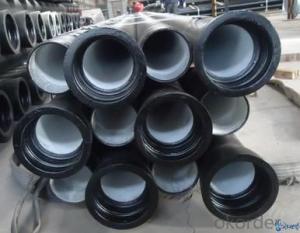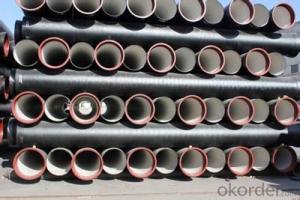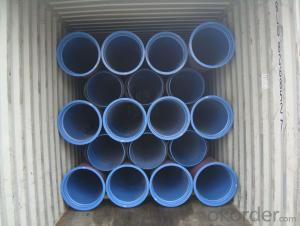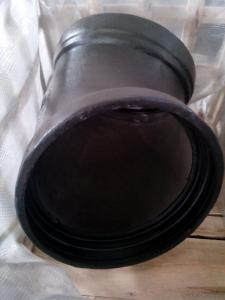DUCTILE IRON PIPE C Class DN100
- Loading Port:
- China Main Port
- Payment Terms:
- TT OR LC
- Min Order Qty:
- -
- Supply Capability:
- -
OKorder Service Pledge
OKorder Financial Service
You Might Also Like
Ductile Iron Cast Pipe is without any defects compare with tradition casting tech, which has many advantages particularly as follow:
(1) High density. In the "vertical upward casting" process, the melt iron of centre liquid column in center crystallizer is continuously feeding for volume shrinkage caused by condensation tube at outer circumference , which lead to be free of shrinkage porosity.
(2) High purity. When melt iron pouring, the mixed impurities such as gas, dross, sand grain which are lighter than melt iron could be eliminated at furnace mouth, its impossible to enter into the crystallizer through the channel, so the melt iron into the crystallizer is very pure.
(3) Strength with toughness. The cooling speed provided by continuous crystallizer is 30 times than sand casting and 5 times than centrifugal casting, and doesn't produce white iron, the eutectic cell volume of continuous cast iron is one eighth to one tenth compare with traditional cast iron. The density of graphite nodule in ductile iron can reach 300-700 pcs/mm2. Therefore, all reason above improve the strength and toughness of continuous cast iron.
(4) Free machining. The high speed cooling make the hardening phase (such as boride, steadite) not appear like reticular, massive or thick, but diffuse like fish bone and pane in shape, moreover, there are tiny graphite flakes inlaid hardening phase. It's free machining in BrinellHardness the range of 250-300HB. However, the Brinell Hardness of 250 is top limit to common metal materials.
(5) Uniform composition of tube wall. The convection mixing of liquid column caused by marching type drawing in crystallizer make the composition of tube wall well-distributed, and concentration gradient very little.
(6) High productivity. To the wall thickness of tube under 10mm, the speed of continuous casting is 1 meter/min, to the wall thickness of tube under 20mm, the speed of continuous casting is 0.5 meter/min, which is high efficiency that centrifugal or other casting tech couldn't reach.
- Q: What is the exterior anticorrosion of nodular cast iron pipes?
- Spraying anti-corrosion paint, usually first spray a anticorrosive paint, and then primer 2, paint 2!
- Q: Are ductile iron pipes suitable for installation in areas with high soil compaction and traffic loads?
- Yes, ductile iron pipes are suitable for installation in areas with high soil compaction and traffic loads. Ductile iron pipes have high tensile strength and are highly resistant to external loads, making them ideal for areas with heavy traffic and compacted soil. They are designed to withstand the pressure and stress caused by the movement of heavy vehicles and the weight of the soil above them. Additionally, ductile iron pipes have excellent flexibility, allowing them to absorb and distribute the load more effectively, reducing the risk of damage or failure. Therefore, they are a reliable choice for installation in areas with high soil compaction and traffic loads.
- Q: Are ductile iron pipes resistant to chemical attacks?
- Generally, ductile iron pipes exhibit resistance to chemical attacks. The high corrosion resistance of ductile iron makes it suitable for a wide range of applications, including water and wastewater systems. To further enhance their resistance to chemical attacks, ductile iron pipes are commonly lined with a protective coating such as cement mortar or epoxy. This lining acts as a barrier between the pipe material and corrosive substances, preventing any degradation of the iron. However, it is important to consider that the level of resistance may vary depending on the specific chemical being transported, as well as the concentration and temperature of the solution. Therefore, it is advisable to seek the guidance of experts or engineers to ensure the appropriateness of ductile iron pipes for specific chemical environments.
- Q: Can ductile iron pipes be used for slurry transportation?
- Yes, ductile iron pipes can be used for slurry transportation. Ductile iron pipes are known for their strength and durability, which makes them suitable for transporting various types of fluids, including slurry. They have the ability to withstand the abrasive nature of slurry and can effectively handle the pressure and flow requirements associated with slurry transportation.
- Q: What are the different lining thickness options for ductile iron pipe?
- The different lining thickness options for ductile iron pipe typically range from 3 to 5 millimeters.
- Q: Can ductile iron pipes be used in marine environments?
- Yes, ductile iron pipes can be used in marine environments. Ductile iron is highly resistant to corrosion and can withstand the harsh conditions found in marine environments, making it an ideal choice for piping systems in such settings.
- Q: What are the typical joint restraint requirements for ductile iron pipes in seismic zones?
- Ductile iron pipes in seismic zones require joint restraints to guarantee structural integrity and prevent displacement or separation during seismic events. These requirements are essential for maintaining the functionality and reliability of the pipeline system. In seismic zones, one common joint restraint requirement for ductile iron pipes is the utilization of flexible or mechanical joint systems. Flexible joints, like rubber gasket joints, are capable of absorbing and accommodating seismic movement. These joints allow for axial movement, angular deflection, and pipe expansion/contraction, thereby reducing the likelihood of pipe failure or damage. Another crucial requirement involves employing adequate anchoring systems to secure the pipes to surrounding structures or embed them in concrete thrust blocks. This prevents excessive movement or displacement during seismic events. Anchoring systems help distribute earthquake forces and minimize the risk of pipe separation or breakage. Moreover, seismic design standards often necessitate the use of seismic restraints, such as seismic joint restraints or bracing systems, to further enhance the stability and integrity of ductile iron pipes. These restraints restrict pipe movement in specific directions, thereby reducing potential damage and preserving overall system performance. It is important to acknowledge that specific joint restraint requirements for ductile iron pipes in seismic zones may vary based on local building codes, seismic activity levels, and engineering considerations. To ensure compliance with necessary seismic resistance requirements, it is crucial to consult relevant regulations and work with experienced professionals during the design and installation process.
- Q: Can ductile iron pipe be used for stormwater systems?
- Yes, ductile iron pipe can be used for stormwater systems. Ductile iron pipe is a strong and durable material that is commonly used for various applications, including stormwater systems. It has excellent corrosion resistance, making it suitable for handling stormwater, which often contains debris and chemicals. Ductile iron pipe also has high tensile strength and can withstand heavy loads and pressures, making it a reliable choice for stormwater systems that may experience significant flow rates and occasional surges. Additionally, ductile iron pipe is available in various sizes and configurations, allowing for flexibility and adaptability in designing stormwater systems.
- Q: What are the different accessories available for ductile iron pipe?
- There are several accessories available for ductile iron pipes that help enhance their functionality and ensure efficient operation. Some of the common accessories include: 1. Flange Adapters: These accessories help connect ductile iron pipes to other pipe materials or equipment such as valves, pumps, or fittings. Flange adapters provide a secure and leak-proof connection. 2. Mechanical Joint Fittings: Mechanical joint fittings are used to join ductile iron pipes together. They consist of a gland, gland follower, and bolts, providing a flexible and easily adjustable connection. 3. Restrained Joint Fittings: These fittings are used in applications where the pipe needs to be restrained to prevent movement or separation. They ensure stability and prevent potential damage from external forces or pressure. 4. Thrust Blocks: Thrust blocks are concrete structures used to resist the thrust generated by internal pressure in ductile iron pipes. They prevent pipe movement and maintain stability. 5. Valve Boxes: Valve boxes provide protection and easy access to valves installed along the ductile iron pipeline. They are typically made of cast iron or polymer materials and are available in various sizes and designs. 6. Hydrant Assemblies: Hydrant assemblies are installed for fire protection purposes. They consist of a ductile iron pipe, a hydrant valve, and a fire hydrant. These assemblies are crucial for quick access to water during firefighting operations. 7. Tapping Saddles: Tapping saddles are used to create a branch connection on a ductile iron pipe without interrupting the flow. They provide a convenient way to install service connections, valves, or meters. 8. Pipe Restraints and Supports: These accessories are used to secure ductile iron pipes to structures or prevent excessive movement. They help maintain proper alignment, prevent sagging, and ensure the structural integrity of the pipeline. 9. Pipe Repair Clamps: In case of pipe damage or leaks, repair clamps provide a quick and temporary solution. These clamps are designed to fit around the damaged area and provide a tight seal to stop the leak. 10. Gaskets and Seals: Gaskets and seals are essential accessories to ensure leak-free connections. They are available in various materials, such as rubber or synthetic compounds, and are used to create a watertight seal between pipes or fittings. These are just a few examples of the accessories available for ductile iron pipes. The selection of accessories depends on the specific requirements of the project, and consulting with a pipe supplier or engineer is recommended to ensure the right accessories are chosen for the application.
- Q: Are ductile iron pipes resistant to environmental stress cracking?
- Indeed, environmental stress cracking is not a concern for ductile iron pipes. Ductile iron, a form of cast iron that has been infused with small amounts of magnesium for enhanced strength and ductility, possesses this advantageous quality. Consequently, these pipes exhibit exceptional resistance to cracking and harm caused by environmental stress factors like temperature fluctuations, soil shifting, and corrosive elements present in the surrounding environment. Moreover, the inherent robustness and adaptability of ductile iron enable it to endure substantial external pressure and stress without succumbing to cracking or failure. Ultimately, ductile iron pipes are a dependable and long-lasting option for various purposes, such as the transportation of water and wastewater, thanks to their ability to withstand environmental stress cracking.
Send your message to us
DUCTILE IRON PIPE C Class DN100
- Loading Port:
- China Main Port
- Payment Terms:
- TT OR LC
- Min Order Qty:
- -
- Supply Capability:
- -
OKorder Service Pledge
OKorder Financial Service
Similar products
Hot products
Hot Searches
Related keywords
